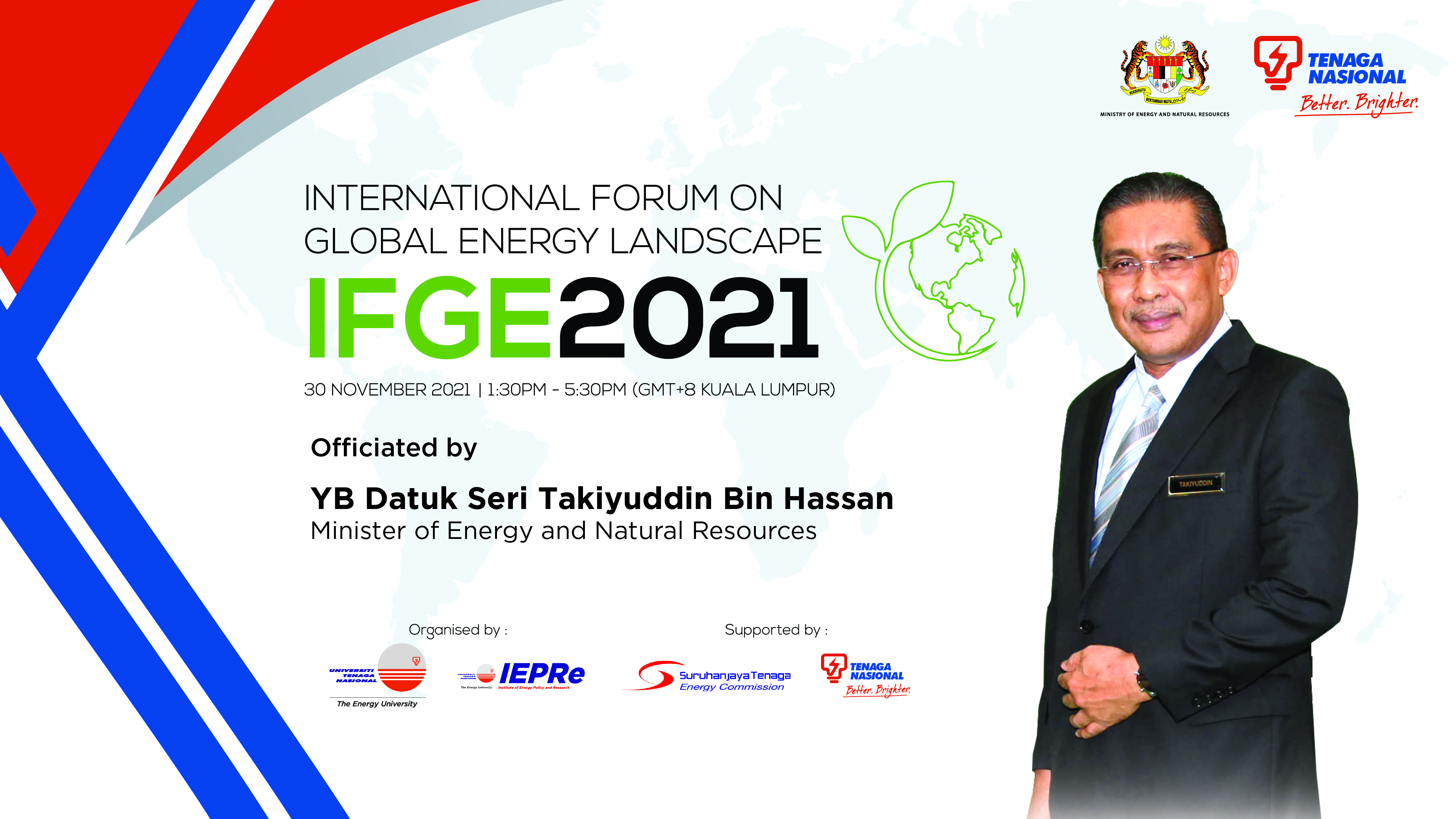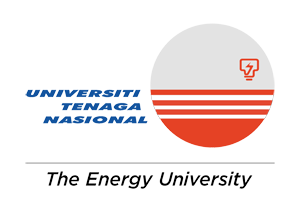International Forum On Global Energy Landscape (IFGE) 2021: Global Energy Transition Towards Carbon Neutrality: Challenges, Opportunities, And Implications To Malaysia
Published on Monday, December 6, 2021
The much-awaited 4th International Forum on Global Energy Landscape (IFGE 2021) with the theme “Global Energy Transition Towards Carbon Neutrality: Challenges, Opportunities, and Implications to Malaysia” was held on 30 November 2021. Due to the ongoing COVID-19 pandemic, the forum which is a flagship programme of the Chair of Energy Economics of Energy Commission at UNITEN was held in a hybrid onsite and online mode. The onsite opening ceremony was conducted at DK1, College of Computing and Informatics, UNITEN Putrajaya Campus, and was live-streamed to IFGE 2021 virtual platform which was attended by more than 300 participants from 21 countries.
The event began at about 1.55 pm with the arrival of the Minister of Energy and Natural Resources, YBhg. Datuk Seri Takiyuddin Bin Hassan. The arrival of the Minister was immediately followed by choral of national anthem ‘Negaraku’ and prayer recitation. Thereafter, the emcee, Associate Professor Dr. Zuraidah Ali gave a brief overview of the IFGE 2021. The opening speech was delivered by the Chair in Energy Economics of Energy Commission at UNITEN, Professor Dr. Ken Koyama. The opening speech entitled “Outlook and Challenges for Our Energy Future” addressed several issues such as volatility of energy price and market uncertainty, global waves on carbon neutrality targets, the impact of Biden’s administration in the United States (US), the US-China cold war, energy geopolitics, prospects for advanced and innovative technologies such as hydrogen, and the uncertainty of the energy future. In his conclusion, Professor Dr. Ken said that many challenges need to be addressed in pursuit of the carbon-neutral pathway. The opening speech was immediately followed by the welcoming speech delivered by the Vice Chancellor (VC) of UNITEN, YBhg. Professor. Dato’ Ir. Dr. Kamal Nasharuddin Mustapha. In the VC’s speech, several achievements recorded by the university both nationally and internationally in the area of energy research were highlighted. He also highlighted the numerous achievements of IEPRe and the Chair in Energy Economics of the Energy Commission at UNITEN. He acknowledged the continuous support of the Energy Commission and Tenaga Nasional Berhad in supporting the Chair of Energy Economics of the Energy Commission at UNITEN.
The VC’s welcoming speech was immediately followed by the officiating speech of the IFGE 2021 by the Minister at Ministry of Energy and Natural Resources (KeTSA), YB Datuk Seri Takiyuddin Hassan. In his speech, Datuk Seri Takiyuddin Hassan said Malaysia needed to get back on track towards low-carbon sustainable development while balancing climate mitigation and adaptation. He said the post-pandemic recovery also provided an opportunity to coordinate public policy related to climate change, thus reducing the risk of locking in carbon-intensive infrastructures. He further highlighted the readiness of the government to provide stimulus packages that would accelerate the transition towards carbon neutrality and increase resilience to future shocks caused by climate change. Datuk Seri Takiyuddin Hassan said, in combating climate change, Malaysia had stated its commitment to achieving a 45 percent reduction in the intensity of greenhouse gas emissions in Gross Domestic Product (GDP) by 2030. He said it required an energy transition process, namely the use of more efficient, clean, and renewable energy sources to replace fossil fuels. He highlighted required measures to meet the target for carbon neutrality in Malaysia such as improving energy efficiency, reducing dependence on coal, and increasing the capacity of renewable energy sources. Datuk Seri Takiyuddin Hassan said that in transition to a clean energy economy, the government is committed to increasing the installed capacity of renewable energy to 31% in 2025, and 40% in 2035. He concluded by commending the Energy Commission and Tenaga Nasional Berhad for supporting the Chair in Energy Economics of Energy Commission at UNITEN and seek for their continuous support. Datuk Takiyuddin officially declared the opening of IFGE 2021 at about 3:05 pm.
The first plenary session which focused on the challenges and opportunities of carbon neutrality from the global and regional perspectives was moderated by Professor Dr. Ken Koyama and commenced at about 3:20 pm with the keynote speech by Mr. Thomas Spencer, an Analyst and Power Sector Modeller at the International Energy Agency (IEA), France. His keynote speech entitled “IEA World Energy Outlook and the Roadmap to Net Zero by 2050” highlighted the different scenarios developed by IEA to attain net-zero emissions by 2050. The key points from the various scenario analysis include massive clean energy expansion, the deployment of solar PV and wind energy to increase global renewable energy target to 30% by 2050, rapidly scaling up clean energy technology such as electric vehicles, and the need to scale up energy efficiency as well as green retrofitting of buildings. The second speaker, Dr. Han Phoumin, Senior Energy Economist at the Economic Research Institute for ASEAN and East Asia (ERIA) delivered his keynote speech entitled “Decarbonization Scenarios Towards Carbon Neutrality In ASEAN: Methodology and Expected Results”. In his speech, Dr. Han stated that there is rapid growth in energy demand and the energy landscape in the ASEAN countries in which coal, oil, and natural gas accounted for over 80% of primary energy. To address these challenges, he stated that the deployment of solar PV in ASEAN can be accelerated since the solar resources cut across the ASEAN countries, unlike wind resources. He further stated that aggressive policy targets will enable ASEAN to achieve net-zero emissions and carbon neutrality. He highlighted the importance of hydrogen innovations in realizing net-zero emissions. The plenary session was anchored by Prof. Dr. Ken Koyama addressing several questions related to the keynote speeches. Prof. Dr. Ken asked the panelist to recommend possible ways by which the policymakers and the government can achieve carbon neutrality in Malaysia. Mr. Thomas Spencer suggested the establishment of short-term and long-term policy frameworks as well as innovation in renewable energy technologies. Dr. Han reiterated that Malaysia as a high-income country would be able to introduce policy changes toward decarbonization and suggested that the government should invest more in clean energy technologies to achieve carbon neutrality.
The second plenary session was preceded by a keynote speech from YBhg. Dato’ Seri Ir. Dr. Zaini Ujang, the Secretary-General of the Ministry of Environment and Water (KASA). In his speech, Dato, Seri Ir. Dr. Zaini highlighted the stand and commitment of the Malaysian government in the recent COP26 held in Glasgow, United Kingdom. He highlighted the effort of the government in energy and environmental sustainability as highlighted in the Twelfth Malaysian Plan. He said Malaysia intends to reduce its economic-wide carbon intensity (against GDP) by 45% in 2030 compared to the 2005 level. He emphasized that the 45% of carbon reduction is unconditional. Subsequently, a panel discussion was initiated by the speech of the first panellist, Encik. Ts. Shamsul Bahar Mohd Nor, the CEO of Malaysian Green Technology and Climate Change Corporation (MGTC). He highlighted the various programmes that have been embarked on by MGTC in supporting the aspiration of carbon neutrality in Malaysia. The second panellist, Encik Rosman Hamzah, the Secretary-General of Malaysia Gas Association (MGA) in his keynote speech highlighted the commitment of MGA in ensuring the availability of natural gas, which is a clean and efficient source of energy, to various users in Malaysia. The third panellist, Professor Ir. Dr. Abd Halim Shamsuddin, the AAIBE Chair for Renewable Energy at UNITEN highlighted the role of biomass in attaining net-zero emission. He highlighted the use and benefits of biomass as a substitute for coal as a source of fuel for power generation. Successively, a moderated discussion was initiated between five panellists, Mr, Thomas Spencer, Dr. Han Phoumin, Encik. Ts. Shamsul Bahar Mohd Nor, En Rosman Hamzah, and Professor Ir. Dr. Abd Halim Shamsuddin, moderated by Encik Abdul Razib Bin Dawood, the CEO of Energy Commission. A question and answer session was also conducted to address questions received from online participants. Issues deliberated include the financing options available for clean energy, the differences between net-zero emissions and carbon neutrality, and the impact of carbon pricing on the overall cost of electricity.
The closing remark was delivered by the CEO of the Energy Commission, Encik Abdul Razib Bin Dawood. He highlighted the various issues that were deliberated from the beginning of IFGE 2021 and restated the recommendations given by the panellists. He concluded by appreciating the efforts of various stakeholders and the organising committee in ensuring the success of the IFGE 2021.

